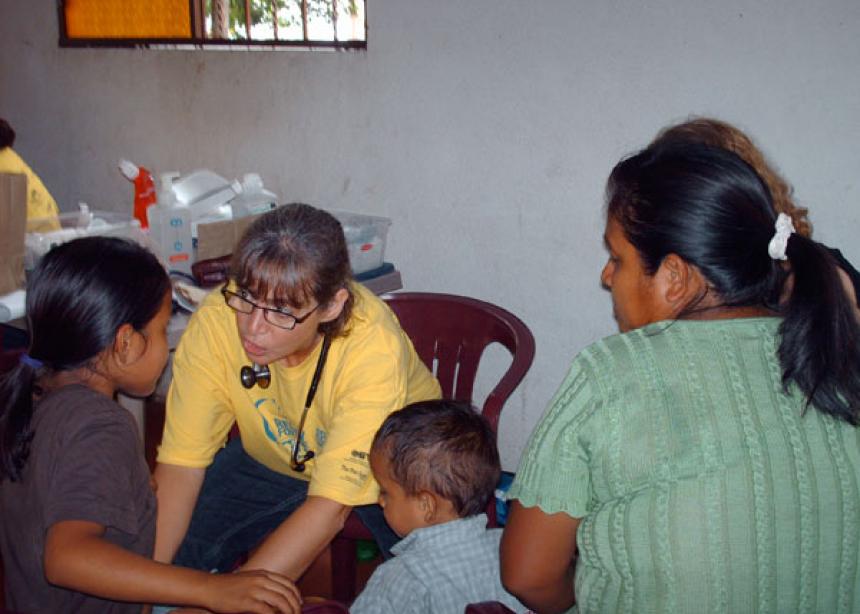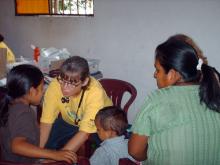The following articles are from a presentation by Wendy and Phil Dyck at Rockway Mennonite Church several months ago.
In 1972 my family moved to India for a three-year term with Mennonite Central Committee. This was in the days before Skype and the internet and email—in fact we didn’t even have our own telephone in our house. I was nine years old that first Christmas in India, and it was a different experience. There was no snow, no Christmas tree, no turkey, no large family gathering. My presents looked different too; they were laid out on a table in the living room on Christmas morning, and not wrapped in colourful Christmas paper. My Mom was a bit apologetic.
I was a bit disappointed, but the hand-sewn doll with multiple outfits fashioned from clothing I had outgrown, would become one of my most cherished presents ever.
After presents, my Dad urged us outside, in the sun, to sit on the hillside, but my sister and I were bickering and uncooperative. This wasn’t the family moment my Dad had envisioned. I remember him chastising us for our behaviour, and telling us that this was, after all, Christmas morning, and that it was worthwhile to spend some time thinking about that.
This was the first time I recognized that the voice of God was not something that just “happened,” but it is a relationship that you can put effort into cultivating.
In my teenage years our youth group attended a large Christian revival-style concert. The performers created an inspirational, emotional energy with their music and we were rocking out to God! At intermission, we were asked to put a hand into a pocket, and draw out whatever God led us to donate into the bucket being passed around. I emptied my pockets. When I told my parents the next day, they snorted and rolled their eyes. This led me to contemplate—what is the voice of God? When is the Spirit leading and when are you being manipulated into an emotional state so that you believe the Spirit is leading? How do you figure that out?
Last April I went to Guatemala with a medical team. We ran clinics in multiple villages, coordinated through small local congregations. I worked with a fine team. The leaders believe God led them to work in Guatemala, and they speak openly about that.
In one of the clinics I saw 11-year-old Sami whose complaint was, “I have a broken heart.” He was born with a heart defect. His father is a pastor, and the family had a prophesy that he would grow up to become a great missionary.
Sami is now going into heart failure. He describes waking up at night feeling like a cat is clawing his chest, as his lungs fill with fluid. He needs surgery soon, or he will die.
I talked to John King, the group leader who lives in Guatemala, after the clinic. I told him that I couldn’t just walk away from Sami without trying to help him, and he told me that I should do what God was leading me to do. He feels that people are called to be at the right place, at the right time, to do the right thing.
When I came home, I was relating this story to a colleague, telling her how we were coordinating testing and referral so that hopefully Sami’s heart would be fixed in time. She said to me, “Why this kid?” I was surprised by the question and replied, “because his path has crossed mine.” Is reacting to moral proximity the voice of God?
It has not become easier for me, over time, to discern the still small voice of God. I find it all a bit confusing and overwhelming. When am I doing the right thing because it makes me feel good and others will approve? When am I being led or placed by God?
Is it right to volunteer time in a poor country, or is it wrong to fly there?
I try to discern the voice of God in my daily life, and to hand myself over to His guidance, through prayer and snippets of quiet meditation. But I am often distracted, busy, irritated, and tired, and just running on that hamster wheel of daily life—not in the best state for listening.
I actually find myself contemplating God most at work when I am talking with elderly patients. They slow me down. They are nearer the end of life, which leads to interesting discussions.
I am blessed with a group of Old Order Mennonite patients. By and large, they seem to have a different perspective on health and illness than the rest of us. They are calm and accepting of what life hands them. They have faith that things will work out alright. They don’t seem to be doing battle through life, and I try to learn from them.
Of course, this attitude also means they don’t seem too fussed about keeping their blood sugars down and therefore do not necessarily follow their doctor’s suggestion to skip the pie.
I also feel God’s presence and calming spirit in some obvious ways—a beautiful piece of music, the ribbon-like swoop of a flock of birds, a heart-felt prayer.
I’m not sure much has changed since I was a child. My relationship with God is still worth cultivating, and it is still hard to discern what the still, small voice of God is telling me. Perhaps the point is simply to keep questioning and struggling and learning with as good an intent as possible.
Wendy Reimer is a family doctor in the Kitchener-Waterloo area, and a member of Rockway Mennonite Church.








Add new comment
Canadian Mennonite invites comments and encourages constructive discussion about our content. Actual full names (first and last) are required. Comments are moderated and may be edited. They will not appear online until approved and will be posted during business hours. Some comments may be reproduced in print.